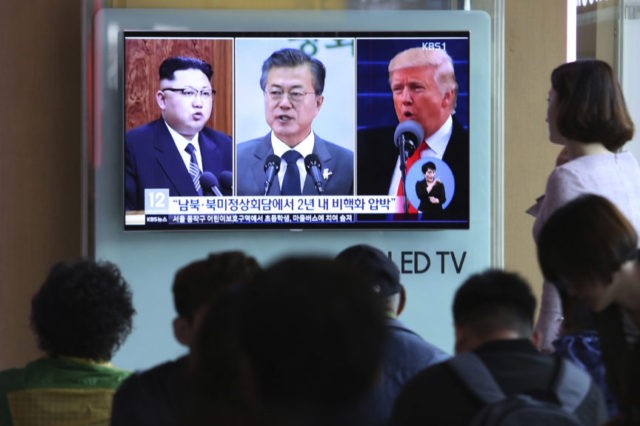With a historic summit between North and South Korean leaders just days away, and a meeting between dictator Kim Jong-un and U.S. President Donald Trump penciled in for next month, North Korea’s state-run Rodong Sinmun newspaper published a fiery editorial on Sunday declaring that Communist purity will be firmly maintained against America’s “cultural poisoning.”
The theme of the Rodong Sinmun piece is that North Koreans shouldn’t worry too much about the hardships resulting international sanctions against Pyongyang’s nuclear weapons program, because material goods are much easier to replace than precious ideology:
If one falls captive to the imperialist ideology and culture, one would be powerless though one has powerful military strength. This is a bitter lesson taught by history.
The reactionary ideological and cultural poisoning paved a way for aggression by the imperialists in the past, and it is now playing the leading role in aggression.
Any destroyed material wealth can be restored, but nothing can make up for the mental and moral ruin of human being or the ideological and cultural ruin of the nation.
The reactionary culture of the bourgeois is an ideological poisoning making the people morally degenerate but the socialist ideological culture an ideological and mental food totally favoring the independent requirements and creative activities of the popular masses.
North Korean propaganda portrays South Korea as a hapless puppet of American interests, arguing that the government in Seoul doesn’t even qualify as a legitimate nation-state. Rodong Sinmun’s editorialists doubtless felt it was important to issue this warning about cultural and ideological contamination before the Moon-Kim summit, especially given speculation that they will discuss formally ending the Korean War after six decades.
The Kim regime doubtless wishes to reassure its people that the new diplomatic opening won’t compromise North Korea’s cultural and political integrity, no matter how many South Korean pop singers turn up in Pyongyang to serenade the Communist elite.
It’s easy for state-managed propaganda writers to insist that ideology is more valuable than material goods when other people are bearing the brunt of sanctions against the Kim regime.
“There is growing evidence that tough new sanctions imposed on North Korea to stop its nuclear weapons and missile programs have begun to bite, and bite hard,” the New York Times reported on Friday. “Factories have closed because of a lack of raw materials, fishermen have deserted their boats and military units are resorting to charcoal-engine vehicles and even ox-driven carts for transport.”
The Times noted that North Korea’s techniques for coping with the sanctions include smuggling, shifting scarce resources to the military and political elite, and “patriotic appeals” such as the Rodong Sinmun editorial. Decades of such propaganda have made North Korea capable of withstanding tremendous economic pressure, as the people are prepared to suffer so their ruling class and military can remain comfortable.
“If you think the North Koreans would revolt or the regime would collapse because of sanctions, you don’t know anything about the North Koreans. These are people who survived the famine by eating weeds and even talk proudly about it,” North Korean defector Kang Mi-jin pointed out.
The key difference this time, according to the more optimistic analysts, is that North Korea is suffering a degree of sanctions pain that its people simply cannot absorb, especially since China signed on to the sanctions program. Industries are shutting down, sources of hard currency have been choked off, and shortages of food and fuel could be on the horizon. It may not be enough to bring Pyongyang to the “breaking point,” but it might have inspired Kim to make a deal before the breaking point arrives.

COMMENTS
Please let us know if you're having issues with commenting.